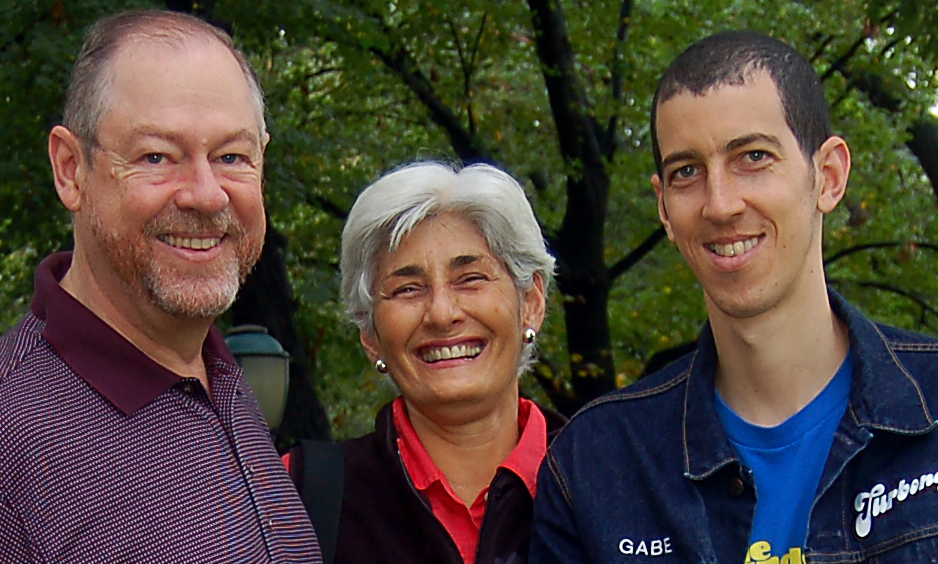
First of all, let’s not forget what really matters. Here I am with my wife Maria Eugenia (Maru) and our son Gabriel in New York City in 2008. They’ve been along for the many ups and downs.
My name is Fernando Quirós, an unlikely combination of old white guy and Latino. Born in Costa Rica, I have lived here since 1971. People I meet on the street are more likely to try to speak to me in English than Spanish, pegging me as one more tourist.
From a young age, I developed an interest in serious photography. My QuirosFoto website is linked to this blog, just below this page under the menu, in case you’re curious.
I attended good Catholic schools: St. Francis High School in LA, and the University of Notre Dame in South Bend, Indiana. You know, the Fighting Irish and all that big time football (which I photographed) along with excellent teaching and academics. Graduated with a B.A. in economics in 1969. Despite a pedestrian GPA, I wrote my way into the then top-ten University of Southern California Law School. They were big on the writing sample in the Law School Admissions Test. But Los Angeles, law school and I were a terrible fit. I was miserable, and flunked out after the first year. But that thing about good writing ability proved prophetic.
Growing up, I often visited Costa Rica on summer vacations. Needing a reset after my USC Law fiasco, a CR visit looked like just the ticket. I arrived back in this beautiful little country in January 1971, thinking I’d stay a few months. It’s now been 50 years.
Things fell into place for me in Costa Rica as if by magic. I was immediately offered a job as an Algebra and Geometry teacher at Lincoln, a local English language high school. That teaching gig was a major professional turning point for me. I had two things to figure out: the math itself, and how to teach it to young high school minds. Mr. Quirós turned out to be a good teacher, and I got so into math that I attended night classes in calculus at the University of Costa Rica. During that great year 1971 I also met and married Maru. My third major gift from Costa Rica (after being born here, and Maru) was a British foreign aid scholarship. In June 1973 I took an M.A. in Development Economics from the University of East Anglia in Norwich.
Maru and I returned to Costa Rica in 1973. Numbers work now came easily, and my professional career was in finance. I learned spreadsheet before they were electronic – filling in numbers manually in pre-printed grids that then had to be added up, balanced and analyzed. When the computing revolution made this grunt work almost effortless in the 1980s, I thought I owned the financial analysis numbers world.
A detailed CV for my finance career would be a bore for readers. But living it was a fascinating, wild ride.
My professional career in Costa Rica was privileged. Worked in both private companies and banks and lending/investing institutions. Through client portfolios, I was involved with literally hundreds of companies. Over forty years I saw almost all types of businesses, companies and management teams – in conditions from start-up, to bonanza, to doing OK, to going bust. Despite the fascinating work, the ride was not always smooth. Money on the line generates a lot of pressures. I was “invited to resign,” or outright fired, more than I or my family would have liked. But everything was experience. In the second half of my career, I was able to supplement my formal jobs with consultancies, and never fell on really hard times.
My best run was eight years in the late 1990s and early 2000s with the Commonwealth Development Corporation. CDC was the British government’s foreign aid arm aimed at the private sector. I found the Brits, with their brutal frankness, great to work for. In my time with them, the organization transitioned from a traditional development lender to a cluster of venture capital funds. The leap from project loan financing to venture capital investment was challenging, fascinating and liberating. The CDC Costa Rica office was regional for Latin America, so these were my heavy travel years, during which I started writing The Spirit War.
I made a mistake with CDC that was unique in my career – I left too early. As a result, I ended up as the oldest employee in a call center for my last working years before pension age.
There was a silver lining to the humbling aspect of my call center work. My job was English-Spanish telephone translation, helping non-English-speaking Latinos in the US by translating everything from medical to banking to police calls. Mexicans were my favorites; such a beautiful, lilting sing-song accent from humble, hardworking, grateful people.
Despite my checkered career, with the Lord’s help, I never sold my soul. I’ve come through it all with my beautiful wife and my family intact, and a decent Costa Rican pension. And, along the way, I was blessed to write The Spirit War.